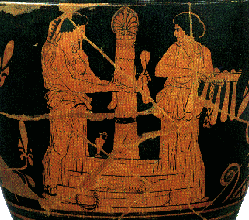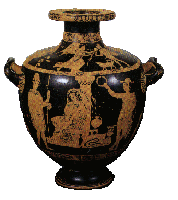 ELECTRA
ELECTRA
the woman of grief
Daughter of Agamemnon and Clytaemnestra, Electra is unknown to Homer and
does not seem to have played a very important role in Archaic mythology.
In the 5th century BC, however, she became one of the most important
figures in the drama of the Atreidae. One of the leading characters in
the Choephoroi of Aeschylus, she clearly takes the leading role in the
Electra of Sophocles and the Electra of Euripides, where she is the one
who pulls the strings of vengeance.
 As a young girl she witnessed the murder of her father and she is the
one who saves her younger brother, Orestes, from Aegisthus, secretly
spiriting him away from Argos. True to the memory of the dead king, her
father, she does not hesitate to come into open conflict with the rulers
and suffer the consequences. Imprisoned in her own home, condemned never
to know the joy of love and marriage, or exiled to the hut of a poor
peasant, whom she is compelled to follow in an unsuitable, humiliating
marriage which is never consummated, Electra's sole hope is for the
return of Orestes and vengeance. And when Orestes does return, it is
Electra, like a vengeful Fury, who arms his hand and steels his spirit
to kill the enemy and usurper Aegisthus, and also their own mother.
As a young girl she witnessed the murder of her father and she is the
one who saves her younger brother, Orestes, from Aegisthus, secretly
spiriting him away from Argos. True to the memory of the dead king, her
father, she does not hesitate to come into open conflict with the rulers
and suffer the consequences. Imprisoned in her own home, condemned never
to know the joy of love and marriage, or exiled to the hut of a poor
peasant, whom she is compelled to follow in an unsuitable, humiliating
marriage which is never consummated, Electra's sole hope is for the
return of Orestes and vengeance. And when Orestes does return, it is
Electra, like a vengeful Fury, who arms his hand and steels his spirit
to kill the enemy and usurper Aegisthus, and also their own mother.
Devoted to the dead, plunged in grief, Electra lives without living,
without the joy of love, without fulfilling the purpose of her nature,
dedicated to vengeance. At the opposite pole to the woman Clytaemnestra
stands the virgin Electra. Both are hard and unrelenting -'my heart is a
hungry wolf, inherited from my mother'- but the former is the
personification of a clearly negative model, while the latter represents
a more positive one, at least for the period at which the tragedies were
written.
 For with her complete faith in her father, which leads her
comprehensively to deny her mother, Electra gives the clearest possible
expression to the patriarchal view of relationships. It is the same view
that dictates the words of Athena and Apollo in the Eumenides of
Aeschylus, when they absolve Orestes of the guilt for the murder of his
mother.
For with her complete faith in her father, which leads her
comprehensively to deny her mother, Electra gives the clearest possible
expression to the patriarchal view of relationships. It is the same view
that dictates the words of Athena and Apollo in the Eumenides of
Aeschylus, when they absolve Orestes of the guilt for the murder of his
mother.